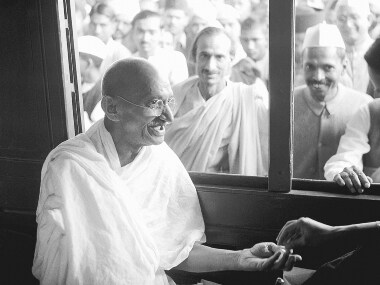S
Shruti Dasgupta
Guest
On the birth anniversary of Mohandas Karamchand Gandhi, let’s explore if ‘Gandhism’ is a failed philosophy of Symbolism over Substance. Unfortunately, to the downtrodden Bharatvasi of the 1900s, the philosophy and teachings of Mahatma Gandhi were like a fresh breath of air. However, his delusional musings have left an indelible mark on India’s attitude and character.
Gandhism is often lauded for its principles of non-violence, truth, and simplicity. However, beneath the surface, this failed philosophy is a paradox of lofty words that often fail to translate into any meaningful action.

PC Tour My India
Gandhism is an ideology of convenience. It is mostly an escape route for weak-minded humans when faced with the complexities of real-world problems. M.K. Gandhi’s actions and words lacked the depth required to address the issues at hand. Going shirtless in solidarity with India’s poor, for instance, was a powerful image but did little to alleviate poverty.
M.K. Gandhi’s technique is adeptly adopted by Mr. Rahul Gandhi. Recall Mr. Rahul’s Bike Trip to vibe with the younger generation. And think about his latest stunt to be a coolie? These acts were never about trying to walk a mile in the other person’s shoes. No, these were acts about perception management. The Gandhi then and the Nehru-Gandhi now, both are far removed from the reality of the inconvenience of daily lives in Bharat.

PC Firstpost
Under the influence of Gandhism, tokenism, and symbolism have become integral to India’s national character. Lofty words and long speeches never lead to any meaningful action. True ‘disobedience’ to the English Masters was never allowed to be achieved, Gandhi only permitted a token resistance for Indians to show their discontent.
Even Gandhi’s terminology for Scheduled Castes was a token of status upliftment. Dare to call a SC/ST “Harijan” and suffer the consequences if you don’t believe it. Another glaring example of Gandhi and his Gandhism is the issue of manual scavenging. Gandhi referred to it as the “highest of work,” but his words did not improve the status of those trapped in this degrading profession.
Thus, Tokenism has become part of the National Character of Bharat and its politicians. Manual scavengers and the oppressed classes face hardships and indignity, while politicians mouth pleasant-sounding rhetorics for their upliftment. A prime example is how Congress and Mr. Rahul Gandhi try to object to every public initiative using OBS, SC/ST, or minority as an excuse. These politicians never have any concrete plans that they can put forward, just loud noises and जुमलेबाज़ी.

PC Political Cartoon Gallery
Mahatma Gandhi’s advocacy of non-violence, encapsulated in the phrase “अहिंसा परमो धर्मः” is often celebrated. However, it is worth noting that Gandhi’s interpretation of this principle sometimes deviated from its original context. The complete shloka is
Gandhi strictly advocated non-violence even in the face of aggression. This form of Gandhism is heavily critiqued for potentially enabling oppressors. Unfortunately, Indians place faith in the half-baked shloka used by M.K. Gandhi. Therefore, when Akhand Bharat was divided into Pakistan and India, Punjabis and Hindus were asked to die passively. Moreover, influential leaders like Subhash Chandra Bose were easily sidelined.
While history textbooks celebrate Gandhism for its principles of non-violence and truth, it is responsible for caste politics, minority appeasement, and tokenism by Indian politicians. Thus, the new Bharat must acknowledge the paradox within this ideology and its tendency to prioritize symbolism over substance. In truth, M.K. Gandhi’s words and actions fell short of resolving the deep-rooted issues plaguing India and its freedom struggle. On this Gandhi Jayanti, let’s reject symbolic gestures and demand Indian politicians to present tangible plans for the betterment of The New Bharat and its people.
The post Gandhism: A Failed Philosophy of Symbolism Over Substance? appeared first on The Jaipur Dialogues.
Continue reading...
Gandhism is often lauded for its principles of non-violence, truth, and simplicity. However, beneath the surface, this failed philosophy is a paradox of lofty words that often fail to translate into any meaningful action.
The Ideology of Convenience
PC Tour My India
Gandhism is an ideology of convenience. It is mostly an escape route for weak-minded humans when faced with the complexities of real-world problems. M.K. Gandhi’s actions and words lacked the depth required to address the issues at hand. Going shirtless in solidarity with India’s poor, for instance, was a powerful image but did little to alleviate poverty.
M.K. Gandhi’s technique is adeptly adopted by Mr. Rahul Gandhi. Recall Mr. Rahul’s Bike Trip to vibe with the younger generation. And think about his latest stunt to be a coolie? These acts were never about trying to walk a mile in the other person’s shoes. No, these were acts about perception management. The Gandhi then and the Nehru-Gandhi now, both are far removed from the reality of the inconvenience of daily lives in Bharat.
Tokenism as National Character

PC Firstpost
Under the influence of Gandhism, tokenism, and symbolism have become integral to India’s national character. Lofty words and long speeches never lead to any meaningful action. True ‘disobedience’ to the English Masters was never allowed to be achieved, Gandhi only permitted a token resistance for Indians to show their discontent.
Even Gandhi’s terminology for Scheduled Castes was a token of status upliftment. Dare to call a SC/ST “Harijan” and suffer the consequences if you don’t believe it. Another glaring example of Gandhi and his Gandhism is the issue of manual scavenging. Gandhi referred to it as the “highest of work,” but his words did not improve the status of those trapped in this degrading profession.
Thus, Tokenism has become part of the National Character of Bharat and its politicians. Manual scavengers and the oppressed classes face hardships and indignity, while politicians mouth pleasant-sounding rhetorics for their upliftment. A prime example is how Congress and Mr. Rahul Gandhi try to object to every public initiative using OBS, SC/ST, or minority as an excuse. These politicians never have any concrete plans that they can put forward, just loud noises and जुमलेबाज़ी.
Misrepresentation of Ahimsa
PC Political Cartoon Gallery
Mahatma Gandhi’s advocacy of non-violence, encapsulated in the phrase “अहिंसा परमो धर्मः” is often celebrated. However, it is worth noting that Gandhi’s interpretation of this principle sometimes deviated from its original context. The complete shloka is
“अहिंसा परमो धर्मः धर्म हिंसा तथैव च:”
Meaning: Non-violence is the highest duty, but righteousness may require the use of force when necessary.
Gandhi strictly advocated non-violence even in the face of aggression. This form of Gandhism is heavily critiqued for potentially enabling oppressors. Unfortunately, Indians place faith in the half-baked shloka used by M.K. Gandhi. Therefore, when Akhand Bharat was divided into Pakistan and India, Punjabis and Hindus were asked to die passively. Moreover, influential leaders like Subhash Chandra Bose were easily sidelined.
The New Bharat
While history textbooks celebrate Gandhism for its principles of non-violence and truth, it is responsible for caste politics, minority appeasement, and tokenism by Indian politicians. Thus, the new Bharat must acknowledge the paradox within this ideology and its tendency to prioritize symbolism over substance. In truth, M.K. Gandhi’s words and actions fell short of resolving the deep-rooted issues plaguing India and its freedom struggle. On this Gandhi Jayanti, let’s reject symbolic gestures and demand Indian politicians to present tangible plans for the betterment of The New Bharat and its people.
The post Gandhism: A Failed Philosophy of Symbolism Over Substance? appeared first on The Jaipur Dialogues.
Continue reading...
